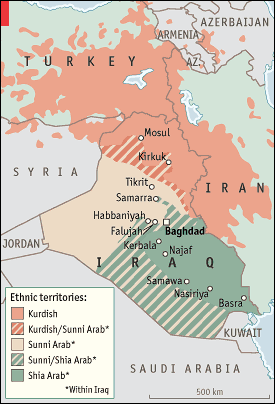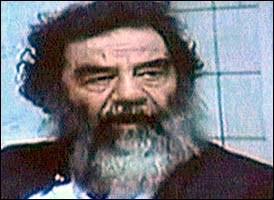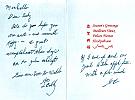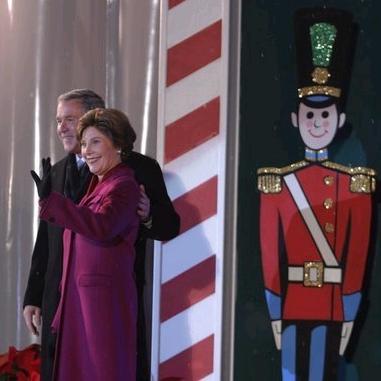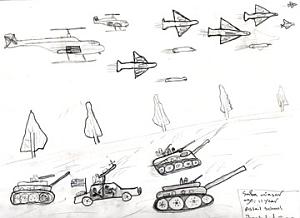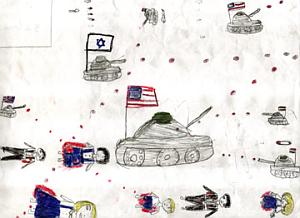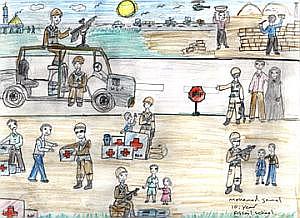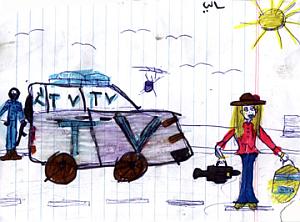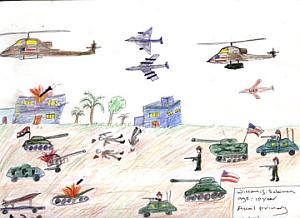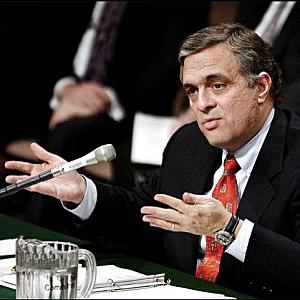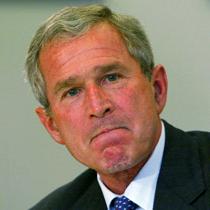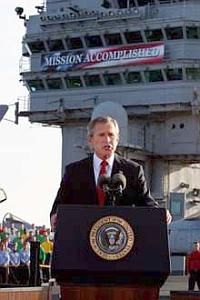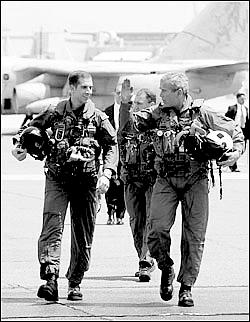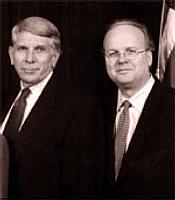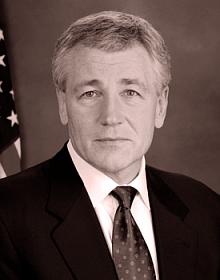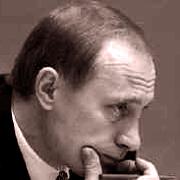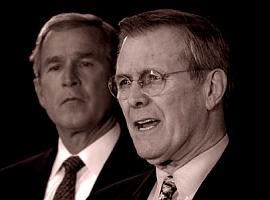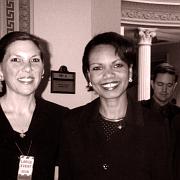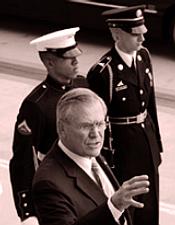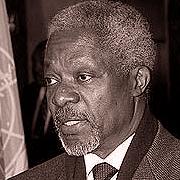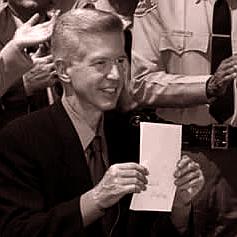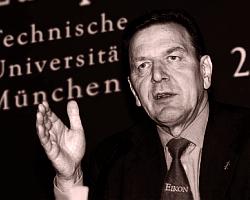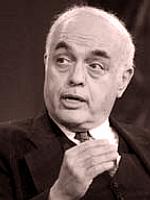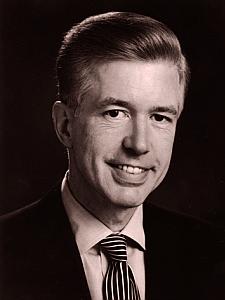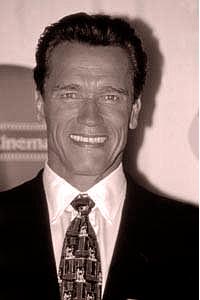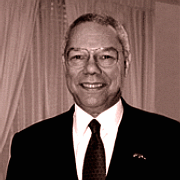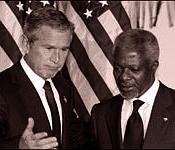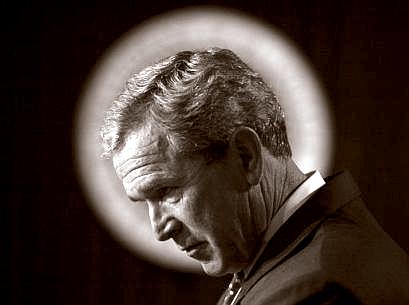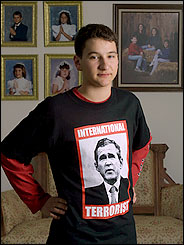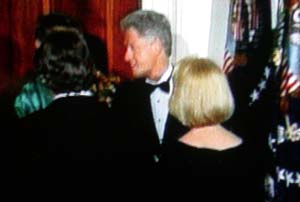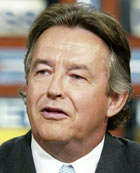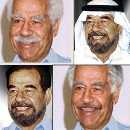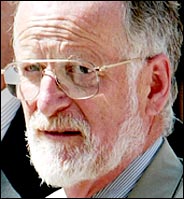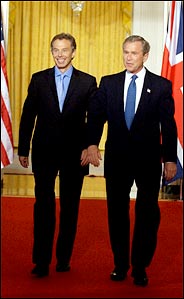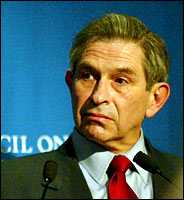More News — February 9-13, 2004
Big article on Cheney at Halliburton. "Contract Sport" -- Jane Mayer in The New Yorker, 2/16 and 2/23/04 (posted 2/9/04):
Vice-President Dick Cheney is well known for his discretion, but his official White House biography, as posted on his Web site, may exceed even his own stringent standards. It traces the sixty-three years from his birth, in Lincoln, Nebraska, in 1941, through college and graduate school, and describes his increasingly powerful jobs in Washington. Yet one chapter of Cheney?s life is missing. The record notes that he has been a ?businessman? but fails to mention the five extraordinarily lucrative years that he spent, immediately before becoming Vice-President, as chief executive of Halliburton, the world?s largest oil-and-gas-services company. The conglomerate, which is based in Houston, is now the biggest private contractor for American forces in Iraq; it has received contracts worth some eleven billion dollars for its work there.
Cheney earned forty-four million dollars during his tenure at Halliburton. Although he has said that he ?severed all my ties with the company,? he continues to collect deferred compensation worth approximately a hundred and fifty thousand dollars a year, and he retains stock options worth more than eighteen million dollars. He has announced that he will donate proceeds from the stock options to charity.
"Bush Was Surprised at Lack of Iraqi Arms" -- Dana Milbank in the Washington Post, 2/9/04:
Bush's promise to release all of his military files, including pay stubs and tax records, has the potential to resolve the long debate over Bush's service from May 1972 to May 1973. No records have been found showing he performed his duties during that period, but he received an honorable discharge, indicating that he had served properly.
Experts in such matters have said payroll records and Bush's annual retirement "point summary" from the time -- neither of which has been uncovered -- should demonstrate definitively how often Bush participated in drills. Such records, unless they have been purged, should exist on microfiche in St. Louis or Denver.
Bush said it was unlikely those records still exist. Asked whether he would allow their release, he replied: "Yeah, if we still have them. But, you know, the records are kept in Colorado, as I understand, and they scoured the records." Bush also said his campaign had authorized the release of such information in the 2000 campaign, but no such information has been released. A spokeswoman, Claire Buchan, said yesterday that all existing records, including pay stubs and retirement points, had already been made available.
"Bush's Records: Still AWOL" -- Eric Boehlert at salon.com, 2/10/04:
President Bush's insistence on Sunday that he released all his military documents during the 2000 campaign has only added to the controversy that surrounds his service in the Texas Air National Guard. In fact, there is no indication Bush has ever authorized that all his military records, including those considered personal under provisions of the Privacy Act, be made public. . . .
In 2000, [Martin] Heldt wrote to the National Guard Bureau, as well as the Air Force, seeking a detailed accounting of Bush's military records. The chief of the National Guard Bureau's support services division informed Heldt that some of his requests were off limits: "Social security numbers, medical records and personnel and administrative information of Mr. Bush and others have been withheld, as release of this information would be a clearly unwarranted invasion of the personal privacy of the personnel affected."
Bush's medical military records, for instance, have never been released to the general public. Nor have any disciplinary reviews, pay stubs, tax records, or personal letters, which would help determine his exact whereabouts in 1972-73. According to the Freedom of Information Act and the Privacy Act, those documents remain under seal unless the military personnel in question (or the next of kin) authorize their release. But NARA offers veterans a sample form to approve that release:
"I authorize the National Personnel Records Center, or other custodian of my military service record, to release to (your name or that of your company and/or organization) the following information and/or copies of documents from my military service record."
Other presidential candidates have been far more open in releasing their military records. On Jan. 16, for example, Democratic contender Wesley Clark released 34 years' worth of military records. Voters were invited to examine the papers at a room at the Manchester Hotel in New Hampshire -- dubbed the "Clark reading room" -- where the documents were laid out for public view.
If Bush had given his permission in 2000 for private information from his military files to be released, his signed authorization would be on file. But there is no evidence yet produced that he did. And a call to the Air Reserve Personnel Center in Denver to determine if that authorization has ever been made was not returned by deadline.
More important, Bush's 2000 authorization, if he made one, would specify whom he allowed to see his personal military records. Having agreed to the release of sensitive documents to one person would not mean those documents would go into packets to meet future FOIA requests. The documents would be limited to the person mentioned in Bush's authorization. It's possible Bush authorized the documents to be released in 2000 but only authorized a campaign aide to see them.
During the 2000 campaign, Bush's spokesman Dan Bartlett, now the White House communications director, told the Associated Press in June of that year that he traveled to the Air Reserve Personnel Center in Denver to review Bush's military file. "I have read it, and there is nothing earth-shattering," Bartlett said at the time. But he never told reporters the campaign was releasing all the documents or that Bush had authorized the press to review whatever it wanted. Instead, reporters researching the story of Bush's military service and searching for documents relied on FOIA requests and whatever other papers the Bush campaign chose to share with them.
The White House has yet to announce whether Bush will sign an authorization notice or when the documents will be made available to the press. When asked about the president's offer to release "everything," White House press secretary Scott McClellan told reporters during Monday's daily press briefing, "We made everything we had available during the 2000 campaign."
"From Guardsman . . ." -- Richard Cohen in The Washington Post, 2/10/04:
During the Vietnam War, I was what filmmaker Michael Moore would call a "deserter." Along with President Bush and countless other young men, I joined the National Guard, did my six months of active duty (basic training, etc.) and then returned to my home unit, where I eventually dropped from sight. In the end, just like President Bush, I got an honorable discharge. But unlike President Bush, I have just told the truth about my service. He hasn't.
At least I don't think so. Nothing about Bush during that period -- not his drinking, not his partying -- suggests that he was a consistently conscientious member of the Texas or Alabama Air National Guard. As it happens, there are no records to show that Bush reported for duty during the summer and fall of 1972. Nonetheless, Bush insists he was where he was supposed to be -- "Otherwise I wouldn't have been honorably discharged," Bush told Tim Russert. Please, sir, don't make me laugh.
It is sort of amazing that every four or eight years, Vietnam -- that long-ago war -- rears up from seemingly nowhere and comes to figure in the national political debate. In 1988 Dan Quayle had to answer for his National Guard service. In 1992 Bill Clinton had to grapple with the question of how he avoided the Vietnam-era draft. Now George Bush, who faced this question the last time out, has to face it again. The reason is that this time he is likely to compete against a genuine war hero. John Kerry did not duck the war. . . .
I was . . . lucky enough to get into a National Guard unit in the nick of time, about a day before I was drafted. I did my basic and advanced training (combat engineer) and returned to my unit. I was supposed to attend weekly drills and summer camp, but I found them inconvenient. I "moved" to California and then "moved" back to New York, establishing a confusing paper trail that led, really, nowhere. For two years or so, I played a perfectly legal form of hooky. To show you what a mess the Guard was at the time, I even got paid for all the meetings I missed.
In the end, I wound up in the Army Reserve. I was assigned to units for which I had no training -- tank repairman, for instance. In some units, we sat around with nothing to do and in one we took turns delivering antiwar lectures. The National Guard and the Reserves were something of a joke. Everyone knew it. Books have been written about it. Maybe things changed dramatically by 1972, two years after I got my discharge, but I kind of doubt it.
I have no shame about my service, but I know it for what it was -- hardly the Charge of the Light Brigade. When Bush attempts to drape the flag of today's Guard over the one he was in so long ago, when he warns his critics to remember that "there are a lot of really fine people who have served in the National Guard and who are serving in the National Guard today in Iraq," then he is doing now what he was doing then: hiding behind the ones who were really doing the fighting. It's about time he grew up.
". . . To 'War President'" -- E. J. Dionne in The Washington Post, 2/10/04:
The strange thing is that while Bush is determined not to repeat the mistakes his father made 12 years ago, he is in the process of repeating, almost precisely, the first Bush administration's fatal mistake.
The president and Karl Rove, his top political adviser, see Bush 41's problem as his estrangement from the Republicans' conservative political base. The first Bush raised taxes, so this Bush will cut them once, twice, many times. The social conservatives didn't trust the elder Bush. So this Bush will make sure that they keep faith with him as a man who keeps the faith.
Here's what's missing from this analysis: The first Bush didn't lose because of defections from the right. He lost because mainstream, middle-class Americans decided, fairly or not, that their president just didn't understand much of anything about their lives. They were worried about their jobs, their health care, their pensions, their housing and sending their kids to college. Voters freely conceded that the first President Bush was first-rate when it came to foreign policy. That just didn't happen to be what they voted on in November 1992.
The current President Bush is putting himself in exactly the same place. If Americans want a war president, he's their man. But in light of the failure to find those weapons of mass destruction in Iraq, many voters now wonder whether that was a war that needed to be fought.
Sure, everybody is happy that Saddam Hussein is gone. But a great many Americans share a concern that Russert raised with Bush: "There are lots of madmen in the world. Fidel Castro; in Iran, in North Korea, in Burma, and yet we don't go in and take down those governments."
Bush's answer that "every situation requires a different response" did not dispose of the question.
In the meantime, Bush is so focused on being our "war president" that he seems to lack passion when he talks about health care or any other domestic issue except tax cuts.
Do not for an instant underestimate the capacity of Bush and Rove to find ingenious ways of focusing our minds on terrorism by the last three weeks of the campaign. They played Democrats for chumps on security issues in 2002. They're certain they can do it again.
But in the past month, Bush reached a tipping point. His credibility -- a huge asset since the days after Sept. 11 -- is in jeopardy. Three years of job losses and wage stagnation are taking a toll on middle-class confidence. I think Bush really does see himself as a war president.
If that's what he's betting the election on, he risks repeating the very experience he has devoted his administration to avoiding -- his father's.
"10 Questions beyond AWOL" -- Peter Keating at jusiper.blogspot.com, 2/10/04:
In September and October 2000, when I was the senior writer for politics at George Magazine, we investigated George W. Bush's military record. . . .
Our original story, which Karthik Thyagarajan and I co-authored and which was published on October 13, 2000, reported that "Bush may have received favorable treatment to get into the Guard, served irregularly after the spring of 1972 and got an expedited discharge, but he did accumulate the days of service required of him for his ultimate honorable discharge." I stand by that conclusion. And I believed that once we presented the evidence that Bush had met the technical requirements for an honorable discharge, the focus of media and political inquiry would shift to what he did during the time he served in the National Guard. The piece was called "The Real Military Record of George W. Bush: Not Heroic, but Not AWOL, Either"; I thought the next round of stories would be about what "not heroic" actually meant.
Instead, the anti-Bush left kept arguing about whether or not Bush actually had gone AWOL, and the Bush campaign ran out the clock. Al Gore made nothing of Bush's military record, major newspapers didn't pick up the thread until just days before the election and TV news ignored the story.
Bush's political advisers erred in thinking they buried this issue forever. But in order for this go-around to be more productive than the last time � either politically for Democrats or just in terms of getting the truth out � the right questions have to be put to the administration. . . .
Did he or his father ever give an okay for a family member or friend to help him get into the Guard? Did either of them ever know about such help? . . .
When he packed up and left Texas for Alabama even though he still owed the Guard service in 1972, what was he thinking? Did he care that his transfer request had been rejected? Did he assume he could get another? . . .
When and how did President Bush decide to permanently stop flying for the Guard? . . .
How was he able to communicate this decision to his superiors in a way that they never asked him to re-train, or to keep flying F-102s until he fulfilled all his service obligations? . . .
Was there a Flight Inquiry Board after George W. Bush's suspension, and if so, what did it find? Was Bush disciplined for missing flights or his physical, and if so, how? . . .
Can Bush provide any details at all about the time he spent in Alabama � where he lived, who he hung out with, what he did? How about just one person whom he served with in the Alabama Guard? . . .
On which exact dates and in what way did Bush make up days in Alabama, and which in Texas? . . .
After so many months of attendance so desultory that his superiors don't remember him showing up, why did Bush develop such a sudden interest in the Guard in the spring of 1973? . . .
Exactly how did Bush "work out" that early discharge? Were the terms of Bush's discharge related to his attachment to Air Reserves headquarters in Denver until late 1974? . . .
One last quote from Meet the Press:
MR. RUSSERT: But you authorize release of everything to settle this?
PRES. BUSH: Yeah. Absolutely. I did so in 2000, by the way.
Actually, he didn't. So Question #10 is: Can we see it all now, please?
"Press Briefing by Scott McClellan" -- whitehouse.gov, 2/10/04, 12:53 P.M. EST
"Facing Questions, White House Releases Bush Military Data" -- David Stout in The New York Times, 2/10/04:
Hoping to quell a controversy before it mushrooms into a full-blown election-year issue, the White House released documents today that it said proved that President Bush honorably completed National Guard service during the Vietnam War era.
"These documents clearly show that the President fulfilled his duties," Mr. Bush's spokesman, Scott McClellan, said as the White House distributed copies of military payroll records attesting that he was paid for service between the spring of 1972 and the spring of 1973.
But Mr. McClellan was peppered with questions about things that the records did not show. He was asked, for instance, why the White House had not brought forth "comrades in arms" of Mr. Bush to offer reminiscences of their service together in the Air National Guard.
Mr. McClellan said, as he did repeatedly, that the documents speak for themselves and prove that Mr. Bush fulfilled his duties.
"I wasn't talking about documents," a questioner said. "I was talking about people." . . .
Mr. Bush enlisted in the Texas Air National Guard in 1968, just before graduating from Yale. The period from May 1972 to May 1973 has come under scrutiny, because during that time he moved to Alabama to work on a senatorial campaign.
No records yet produced have satisfied Mr. Bush's critics on how many meetings he attended, either with the Alabama unit to which he was temporarily transferred or with the Houston unit to which he returned.
The predicament for Mr. Bush and his advisers was underlined today when a questioner noted that a National Guard officer in Houston wrote some years ago that Mr. Bush "has not been observed" at the unit.
That officer has since died. As for the absence of people to attest to serving with Mr. Bush, Mr. McClellan said, "We're talking some 30 years ago."
The records released today ? some of them smudged and hard to read ? showed that Mr. Bush was not paid for National Guard service from December 1972 to February or March 1973, a time in which Mr. Bush lost his active-flight status.
"Where was he in December of '72, February and March of '73?" a questioner persisted. "Why didn't he fulfill the medical requirement to remain on active flight duty status in 1972?"
"The president recalls serving both when he was in Texas and when he was in Alabama," Mr. McClellan said. "And that is what I can tell you. And we have provided you these documents that show clearly that the president of the United States fulfilled his duties, and that is the reason that he was honorably discharged from the National Guard. The president was proud of his service."
The White House seemed to find itself in a situation that is the reverse of what often occurs during Washington controversies: It was offering a legalistic, document-oriented defense when it was being asked to present an anecdotal, people-oriented one.
Mr. Bush offered a strong defense of his military service in an interview last weekend with Tim Russert on NBC's "Meet the Press," asserting that he had had a satisfactory meeting-attendance record "or I wouldn't have been honorably discharged."
Schedules varied in National Guard and Reserve units in that era. A typical schedule called for two evening meetings of four hours each, plus one all-day meeting, often on a Sunday, each month. In addition, a unit attended a two-week summer camp at an active military post. A unit member who missed more than a few meetings in a year faced the prospect of being called to active duty.
"Top Bush Aide Is Questioned in C.I.A. Leak" -- David Johnston in The New York Times, 2/10/04:
President Bush's press secretary and a former White House press aide testified on Friday to a federal grand jury investigating who improperly disclosed the identity of a C.I.A. officer, the press secretary and a lawyer for the aide said on Monday.
The appearances of the press secretary, Scott McClellan, and the press aide, Adam Levine, reflected what lawyers in the case said was the quickening pace of a criminal inquiry in which a special prosecutor is examining conversations between journalists and the White House.
When he was asked by reporters on Monday whether he had been questioned in the case, Mr. McClellan said he had been filmed by news organizations as he emerged from the federal courthouse. "I think that confirms it for you," he said.
On Monday, a lawyer for Mr. Levine said the White House aide had also appeared on Friday.
Mr. Levine left the Bush administration in December after working as the principal liaison between the White House and television networks. Mr. Levine's lawyer, Daniel J. French, said, "In keeping with the president's request, Mr. Levine is cooperating with the Justice Department's investigation and in doing so appeared before the grand jury on Friday."
In addition to the grand jury appearances, which are believed to include other Bush administration officials, prosecutors have conducted meetings with presidential aides that lawyers in the case described as tense and sometimes combative.
Armed with handwritten White House notes, detailed cellphone logs and copies of e-mail messages between White House aides and reporters, prosecutors have demanded explanations of conversations between aides and reporters for some of the country's largest news organizations that under ordinary circumstances would never be publicly discussed. So far, no reporter has been questioned or subpoenaed.
One set of documents that prosecutors repeatedly referred to in their meetings with White House aides are extensive notes compiled by I. Lewis Libby, Vice President Dick Cheney's chief of staff and national security adviser. Prosecutors have described the notes as "copious," the lawyers said. In addition, the prosecutors have asked about cellphone calls made last July to and from Catherine J. Martin, a press secretary for Mr. Cheney.
In their discussions with White House aides, prosecutors have been careful to avoid signaling their overall theory of the case. Nor have they given hints about who they suspect leaked the information to Robert Novak, who wrote in a Washington Post column last July 14 that the wife of former Ambassador Joseph C. Wilson IV, a critic of the administration's Iraq policy, was Valerie Plame, a C.I.A. undercover officer.
"Bush Aides Testify in Leak Probe" -- Mike Allen and Susan Schmidt in The Washington Post, 2/10/04:
A federal grand jury has questioned one current and two former aides to President Bush, and investigators have interviewed several others, in an effort to discover who revealed the name of an undercover CIA officer to a newspaper columnist, sources involved in the case said yesterday.
White House press secretary Scott McClellan said yesterday that he talked to the grand jury on Friday. Mary Matalin, former counselor to Vice President Cheney, testified Jan. 23, the sources said. Adam Levine, a former White House press official, also testified Friday, the sources said.
None is suspected by prosecutors of having exposed undercover CIA officer Valerie Plame, but they were questioned about White House public relations strategy, the sources said.
FBI agents have interviewed those and at least five other current and former Bush aides and have questioned them about thousands of e-mails that the White House surrendered in October, along with stacks of call logs and calendars, the sources said.
The logs indicate that several White House officials talked to columnist Robert D. Novak shortly before July 14, when he published a column quoting "two senior administration officials" saying that Plame, "an agency operative on weapons of mass destruction," had suggested her husband for a mission to Niger to investigate whether Iraq tried to acquire uranium there as part of an effort to develop nuclear weapons.
White House witnesses have been asked about cell phone calls and have been shown handwritten, diary-style notes from colleagues, as well as e-mails from reporters to administration officials. In at least a few cases, the FBI questioning was portrayed as very aggressive, with agents homing in on specific conversations with journalists. "Even witnesses that they describe as being potentially helpful are being treated as adversaries," a source close to the investigation said.
"Kerry's Army Invades Bush Territory" -- Josh Benson at salon.com, 2/10/04:
To understand John Kerry's Southern strategy, you just had to check out Table 17 at the Virginia Democratic Party's annual Jefferson-Jackson Day dinner here over the weekend: There was Norm White, B-17 navigator and World War II hero from the 8th Air Force in Europe; Rick O'Dell, a Vietnam Army vet with the 11th armored cavalry; and Del Sandusky, a gunner from one of Kerry's swift boats in Vietnam.
This impressive veterans' brigade, like those appearing on Kerry's flank on the trail, personifies how the front-runner hopes to avoid the same doom as every Democratic presidential contender in Virginia since 1964, should he become the party's nominee. By playing up his own history as a decorated veteran, Kerry is building a case that he is the true military man in this race. Kerry hopes his war hero status will inoculate him against a Republican talking point, one that could play well in the conservative South -- that Kerry's just a liberal senator from Massachusetts who can't be trusted to protect a vulnerable nation from harm. . . .
The other Democratic veteran in the running is, of course, Wesley Clark. At Virginia Wesleyan College in the military town of Norfolk, where a Clark campaign organized a rally over the weekend, the Clark event was staffed largely by soldiers -- ones who served under the general in Europe and Panama and at least one active-duty officer just home from Iraq. . . .
Kerry's campaign is certainly taking advantage of his military experience, appealing to voters here by making a campaign premised on his personal war stories even more muscular. In addition to his now-standard lines about "knowing something about aircraft carriers for real" and invitations to Bush to "bring -- it -- on," Kerry has now issued a more direct challenge than ever around the idea that he, and not the "extremist" president, represents mainstream American values.
Kerry uses his military experience, too, to rebut GOP attacks that he's too liberal. "I have news for George Bush, Karl Rove, Ed Gillespie and the rest of their gang," he said at a rally in Richmond on Saturday. "I have fought for my country my whole life, and I'm not going to back down now. This is one Democrat who's going to fight back."
At the least, Kerry may be having success already in insulating himself from the stereotype that he's a wimpy Northern elitist. Conservative pundit and morality maven Bill Bennett told Fox News over the weekend that simply trying to stick him with a Boston liberal label won't work. "You can't do to Kerry what you did to Dukakis," he said. . . .
What Democrats likely hope to achieve instead of an unrealistic Southern sweep is a steady and incremental erosion of conservative bases of support, not only in the South, but in other areas of the country with conservative-minded swing voters. "This is all about marginal politics," said Larry Sabato, director of the University of Virginia's Center for Politics. "It's exactly how Karl Rove looks at the electorate from Bush's perspective. He's not actually trying to grab a majority of African-Americans or Hispanics -- he's trying to tack two or three or five percentage points onto Bush's showing in those communities. So with Kerry, the military side of the population votes about 70-30 Republican right now, and he might be able to reduce that by a few percentage points. That's what this is about." . . .
Attendance at the Jefferson-Jackson Day dinner on Saturday night dwarfed anything the Virginia Democrats had seen before, attracting 2,000 people -- several times more guests than in the past. "We've just never seen interest like this before, and I think it's really going to make a huge difference in November," she said. "We're going to see a lot of new people voting in the Democratic primary, and we're here to make sure they come back in the general."
"'The Best Things in Life Are Free'" -- Eric Alterman at msnbc.com, 2/10/04:
The next time you read from someone . . . about what a captive of "special interests" John Kerry is, remember this: Bush has so far raised 28 times the amount of PAC money that Kerry has. Of course, next thing you will hear is that it does not matter who has raised more -- or even 28 times as much -- because this fundraising stuff itself is not important . . .
I say, "Oh cut the crap, please, will you?? (No link on the "twenty-eight times" figure because it appears in a forthcoming story that Mike Tomasky and I co-authored for The American Prospect.)
"Rumsfeld Draws Blank on Blair's '45 Minute' Claim" -- AFP article at abc.net.au, 2/11/04:
US Defence Secretary Donald Rumsfeld says he does not recall British Prime Minister Tony Blair's pre-war claim that Iraq had weapons of mass destruction ready to be deployed in 45 minutes. "I don't remember the statement being made, to be perfectly honest," Mr Rumsfeld told a Pentagon news conference. General Richard Myers, the chairman of the Joint Chiefs of Staff, said he did not remember the statement either. The claim made headlines around the world after Mr Blair levelled it in a 55-page "white paper" presented to the House of Commons in September 2002. The dossier said Iraq had military plans to use chemical and biological weapons and "some of these weapons could be deployed within 45 minutes of an order to use them." It later became the centre of a huge scandal in Britain following an allegation in a BBC report that Downing Street had "sexed up" up the Iraqi dossier by inserting the 45-minute claim, knowing it was wrong.
"At Least 47 Die in Baghdad Blast; 2nd Attack in 24 Hours" -- Jeffrey Gettleman and Edward Wong in The New York Times, 2/11/04:
In the second deadly strike in Iraq in two days, a suicide bomber careened a car packed with explosives into a crowd of Iraqi Army recruits in central Baghdad, killing at least 47 and wounding at least 50 others, police officials said. The attack today provoked a new wave of fears that the security situation is spinning out of control.
Several Iraqi politicians said the strike, nearly identical to the bombing of an Iraqi police station in the nearby town of Iskandariya on Tuesday, was timed to intimidate a delegation of United Nations election experts who recently arrived to determine if early elections can be held in Iraq.
"These terrorists want to inflame the area to get the United Nations to give up on the idea of elections," said Wael Abdullatif, a judge from the southern city of Basra who sits on the Iraqi Governing Council. "A week ago, things were quiet. But as soon as the delegation arrived, the violence exploded."
The car bomb in Iskandariya killed at least 54 people and wounded at least 60 others, most of them Iraqi men who were applying for jobs at the police station, a doctor said. . . .
Both attacks appeared to be aimed at Iraqi civilians ready to aid occupation forces in securing the country against groups of criminals, terrorists and insurgents. In Iskandariya, the bomb exploded as a line of job applicants, mostly men, snaked out the door of the police station. . . .
Military officials have said they expect spectacular attacks in the months leading up to the scheduled transfer of sovereignty to an Iraqi government on June 30. Both bombings certainly met that description.
Only two other bombings in Iraq have killed more people. On Feb. 1, two suicide bombers walked into separate offices in Erbil of the main Kurdish political parties and detonated their explosives, killing 109 people. In late August, a car bomb exploded in the holy city of Najaf in southern Iraq, killing at least 80 people, including a respected Shiite cleric.
Colin Powell, My American Journey (1996):
I am angry that so many of the sons of the powerful and well-placed... managed to wangle slots in Reserve and National Guard units ... Of the many tragedies of Vietnam, this raw class discrimination strikes me as the most damaging to the ideal that all Americans are created equal and owe equal allegiance to their country.
"Bush Met Military Obligation, Aide Says" -- Mary Orndorff and Brett J. Blackledge in The Birmingham News, 2/11/04:
A White House spokesman said Tuesday that President Bush worked enough days as a member of the Texas Air National Guard in 1972 and 1973 to fulfill his annual training requirements, but new payroll records he released also show a five-month gap while Bush was assigned to a small reserve unit in Montgomery.
Bush did not receive military pay from May to September of 1972, according to the documents, and the former commander of the 9921st Air Reserve Squadron said Tuesday that Bush didn't show up during those months.
"He never did come to my squad," said retired Lt. Col. Reese Bricken, who lives in Montgomery. "He was never at my unit."
Bricken reviewed documents Tuesday showing Bush's transfer request to his squadron and his response to the request. He said he remembered sending approval back for him to serve in the small unit, made up of reserve members who met weekly.
"He was looking for a place to hang his hat, but he never came by," Bricken said. . . .
Bush's assignment to the 9921st was withdrawn months later because his superiors pointed out it was not part of a combat-ready Guard unit and did not perform work equivalent to what Bush's training regimen as a pilot required. So in September, Bush applied to the 187th Tactical Recon Group, also in Montgomery, according to a Sept. 5, 1972, letter. The three-month transfer was approved. . . .
Joe LeFevers, a member of the 187th in 1972, said he remembers seeing Bush in unit offices and being told that Bush was in Montgomery to work on Blount's campaign.
"I was going in the orderly room over there one day, and they said, `This is Lt. Bush,'" LeFevers said Tuesday. "They pointed him out to me ... the reason I remember it is because I associate him with Red Blount."
Red Blount's son, Winton Blount III, said Bush was the campaign's deputy manager and spent a lot of time in Birmingham and north Alabama.
"He was a very active part of that campaign," said Blount. "And as my aunt said, she hoped people would act as nice in other people's homes as he did."
"Aides Say Records Show Bush Served" -- Wayne Slater and Michelle Mittelstadt in the Dallas Morning News, 2/11/04:
The White House released records Tuesday to buttress the president's assertion that he fulfilled his military duty during the Vietnam War, but it faced new questions about whether George W. Bush's file was altered before his 2000 presidential race.
Retired National Guard Lt. Col. Bill Burkett said Tuesday that in 1997, then-Gov. Bush's chief of staff, Joe Allbaugh, told the National Guard chief to get the Bush file and make certain "there's not anything there that will embarrass the governor."
Col. Burkett said that a few days later at Camp Mabry in Austin, he saw Mr. Bush's file and documents from it discarded in a trash can. He said he recognized the documents as retirement point summaries and pay forms.
Bush aides denied any destruction of records in Mr. Bush's personnel file. "The charges are just flat-out not true," said Dan Bartlett, White House communications director.
He said the president has been forthright in producing all documents relevant to his stint in the Texas Air National Guard, from 1968 to 1973. He dismissed Col. Burkett as a disgruntled former officer of the Texas Guard.
Mr. Allbaugh, now a Washington lobbyist, called Col. Burkett's assertions "hogwash."
A spokesman for the Texas Air National Guard, Lt. Col. John Stanford, dismissed Col. Burkett's account of the conversation as "far-fetched." Of the accusation that the files were altered, he said, "I have no knowledge that such an event ever occurred." . . .
Mr. Bartlett called the Burkett allegations "outlandishly false" and accused him of being part of a group of disgruntled former Guardsmen critical of Maj. Gen. Daniel James III, head of the Texas National Guard before Mr. Bush promoted him to head the National Guard in Washington.
Gen. James' office referred all calls to Col. Stanford.
Col. Burkett acknowledged that he and other Guardsmen questioned the discipline standards and other issues under Gen. James. But Col. Burkett said from his home near Abilene that he remains loyal to the Guard.
Col. Burkett, who has voted in both GOP and Democratic primaries in the past, said he was disturbed over how the Bush file was handled. He initially made his assertions on a Web site two years ago, and they are reported in detail in a forthcoming book, Bush's War for Re-Election, by James Moore.
"I would like it that everybody sees the honest and fair picture here," he said.
According to Col. Burkett, he was at headquarters in the summer 1997 when he heard the conversation between Gen. James and Mr. Allbaugh. He said the Guard commander had the conversation about eliminating "embarrassments" on a speakerphone.
About 10 days later, he said, he saw Texas Gen. John Scribner going through the Bush file.
"I looked down and saw files on the table and of that sort of stuff, and in the wastecan there is a retirement points document that has the name Bush, George W. lLt on it," he said. "There were both originals and Xerox copies in the stack."
Gen. Scribner, now retired, denied the episode. "I sure don't know anything about what he's talking about," he said.
"The President's Guard Service" -- editorial, New York Times, 2/11/04:
If President Bush thought that his release of selected payroll and service records would quell the growing controversy over whether he ducked some of his required service in the Air National Guard three decades ago, he is clearly mistaken. The payroll records released yesterday document that he performed no guard duties at all for more than half a year in 1972 and raise questions about how he could be credited with at least 14 days of duty during subsequent periods when his superior officers in two units said they had not seen him.
Investigative reporting by The Boston Globe, our sibling newspaper, revealed in 2000 that Mr. Bush had reported for duty and flown regularly in his first four Texas Guard years but dropped off the Guard's radar screen when he went to Alabama to work on a senatorial campaign. The payroll records show that he was paid for many days of duty in the first four months of 1972, when he was in Texas, but then went more than six months without being paid, virtually the entire time he was working on the Senate campaign in Alabama. That presumably means he never reported for duty during that period.
Mr. Bush was credited with 14 days of service at unspecified locations between Oct. 28, 1972, and the end of April 1973. The commanding officer of the Alabama unit to which Mr. Bush was supposed to report long ago said that he had never seen him appear for duty, and Mr. Bush's superiors at the Texas unit to which he returned wrote in May 1973 that they could not write an annual evaluation of him because he had not been seen there during that year. Those statements are so jarringly at odds with the payroll data that they demand further elaboration. A Guard memo prepared for the White House by a former Guard official says Mr. Bush earned enough points to fulfill his duty but leaves it unclear whether he got special treatment.
"Ex-Officer: Bush's File's Details Caused Concern" -- Dave Moniz and Jim Drinkard in USA Today, 2/11/04:
As Texas Gov. George W. Bush prepared to run for president in the late 1990s, top-ranking Texas National Guard officers and Bush advisers discussed ways to limit the release of potentially embarrassing details from Bush's military records, a former senior officer of the Texas Guard said Wednesday.
A second former Texas Guard official, who spoke only on condition of anonymity, was told by a participant that commanders and Bush advisers were particularly worried about mentions in the records of arrests of Bush before he joined the National Guard in 1968, the second official said.
Bill Burkett, then a top adviser to the state Guard commander, said he overheard conversations in which superiors discussed "cleansing" the file of damaging information.
The White House dismissed Burkett's charge Wednesday. It is an "outrageously false statement," said White House communications director Dan Bartlett, who handled the records in the late 1990s as an aide to Gov. Bush. Administration officials dismiss Burkett as a disgruntled former Guardsman who had a falling-out with his superiors.
Two forms in Bush's publicly released military files � his enlistment application and a background check � contain blacked-out entries in response to questions about arrests or convictions. Bush acknowledged in biographies published in 1999 that he was arrested twice before he enlisted in the Air National Guard: once for stealing a wreath and another time for rowdiness at a Yale-Princeton football game.
The nature of what was blacked out in Bush's records is important because certain legal problems, such as drug or alcohol violations, could have been a basis for denying an applicant entry into the Guard or pilot training. Admission to the Guard and to pilot school was highly competitive at that time, the height of the Vietnam War.
The National Guard cited privacy as the reason for blacking out answers. The full, unmarked records have never been released. Bartlett did not respond Wednesday to a request to release the records with nothing blacked out, which Bush could do as the subject of the records.
Burkett says that the state Guard commander, Maj. Gen. Daniel James III, discussed "cleansing" Bush's military files of embarrassing or incriminating documents in the summer of 1997. At the time, Burkett was a lieutenant colonel and a chief adviser to James. He says he was just outside James' open office door when his boss discussed the records on a speakerphone with Joe Allbaugh, who was then Gov. Bush's chief of staff.
In Burkett's account, Allbaugh told James that Bush's press secretary, Karen Hughes, was preparing a biography and needed information on Bush's military service.
In an interview, Burkett said he recalled Allbaugh's words: "We certainly don't want anything that is embarrassing in there." Burkett said he immediately told two other officers about the conversation and noted it in a daily journal he kept. The two officers, George Conn and Dennis Adams, confirmed to USA TODAY in 2002 that Burkett told them of the conversation within days.
Soon afterward, there was a series of meetings of top commanders at Texas Guard headquarters at Camp Mabry. Bush's records were carried between the base archives and the headquarters building, according to Burkett and the second Guard official, who was there.
The meetings were confirmed in a 2002 interview by USA TODAY with William Leon, who was the state Guard's freedom-of-information officer in the 1990s. He was involved in discussions about what to release. Leon declined to comment on the substance of the meetings except to say, "We were making sure we released it properly and made sure we did it in a timely manner."
Contacted at home Wednesday night, he refused to talk to a reporter. He said: "Don't ever call me again at home. I'll call your publisher and sue you."
Burkett first made his allegation just before the 2000 election, when it was carried on some Internet sites but went largely unreported by mainstream news media. The issue resurfaced Wednesday in the Dallas Morning News as Bush's military record took center stage in the presidential campaign.
Allbaugh, James and the White House denied Burkett's story. As president, Bush has since elevated James to be director of the Air National Guard for the entire country.
In an interview that aired Sunday on NBC's Meet the Press, Bush said he fulfilled his Guard commitment and offered to make his records public. Host Tim Russert asked, "Would you authorize the release of everything to settle this?" Bush replied, "Yes, absolutely."
Since then, White House officials have released only documents concerning whether Bush fulfilled his service obligations. White House statements have not addressed the release of any papers that could show disciplinary actions, medical exams, legal scrapes and the like.
On Tuesday, the White House released pay records from a military archive in Denver that it said showed Bush was paid for at least the minimum training time he was obligated for in 1972 and 1973.
But the records showed only what days he was paid for, not where he was or what duty he performed. Neither did they address outstanding questions about why Bush missed a required physical in 1972, forcing him to stop flying, or what happened during a five-month gap in 1972 when Bush didn't show up for training.
"Move to Screen Bush File in 90's Is Reported" -- Ralph Blumenthal in The New York Times, 2/12/04:
A retired lieutenant colonel in the Texas National Guard complained to a member of the Texas Senate in 1998 that aides to Gov. George W. Bush improperly screened Mr. Bush's National Guard files in a search for information that could embarrass the governor in future elections.
The retired officer, Bill Burkett, said in the letter to Senator Gonzalo Barrientos, a Democrat from Austin, that Dan Bartlett, then a senior aide to Governor Bush and now White House communications director, and Gen. Daniel James, then the head of the Texas National Guard, reviewed the file to "make sure nothing will embarrass the governor during his re-election campaign."
A copy of the letter was provided to The New York Times by a lawyer for Mr. Burkett to support statements he makes in a book to be published this month, which Mr. Burkett repeated in interviews this week, that Mr. Bush's aides ordered Guard officials to remove damaging information from Mr. Bush's military personnel files.
Mr. Bartlett denied on Wednesday that any records were altered. General James, since named head of the Air National Guard by President Bush, also denied Mr. Burkett's account. But Mr. Bartlett and another former official in Mr. Bush's administration in Texas, Joe Allbaugh, acknowledged speaking to National Guard officials about the files as Mr. Bush was preparing to seek re-election as governor.
Kevin Drum's interview with Bill Burkett on the "scouring" of George W. Bush's National Guard record (posted 2/12/04).
"Doubts Raised on Bush Accuser" -- Michael Rezendes in The Boston Globe, 2/13/04:
For at least six years, a retired Texas National Guard officer has maintained that President Bush's record as a member of the Guard was purged of potentially embarrassing material at the behest of high-ranking Bush aides laying the groundwork for Bush's 2000 run for the presidency.
Retired Lieutenant Colonel Bill Burkett, who has been pressing his charges in the national news media this week, says he even heard one high-ranking officer issue a 1997 order to sanitize the Bush file, and later saw another officer poring over the records and discovered that some had been discarded.
But a key witness to some of the events described by Burkett has told the Globe that the central elements of his story are false.
George O. Conn, a former chief warrant officer with the Guard and a friend of Burkett's, is the person whom Burkett says led him to the room where the Bush records were being vetted. But Conn says he never saw anyone combing through the Bush file or discarding records.
"I have no recall of that," Conn said. "I have no recall of that whatsoever. None. Zip. Nada."
Conn's recollection also undercuts another of Burkett's central allegations: that he overheard Bush's onetime chief of staff, Joe M. Allbaugh, telling a Texas Guard general to make sure there were no embarrassments in the Bush record.
Burkett says he told Conn, over dinner that same night, what he had overheard. But Conn says that, although Burkett told him he worried that the Bush record would be sanitized, he never mentioned overhearing the conversation between Allbaugh and General Daniel James III.
Burkett's allegations about the Bush records come as the White House is attempting to answer mounting questions about whether Bush fulfilled his obligations as a member of the Texas Air Guard during the early 1970s. Burkett's allegations also will be a major focus of a book on Bush to be published next month.
But the book's author, James Moore, a former Houston TV news correspondent, concedes he never interviewed some of the key players who could have verified Burkett's charges, including Conn and retired National Guard Colonel John Scribner -- the officer Burkett says he saw removing items from the Bush file.
Moore, told yesterday that Conn contradicts Burkett's story, said he believes Burkett's allegations are true. "I think we're into a classic he-said, she-said," Moore said.
"The Cleansing of the President" -- Kevin Drum at calpundit.com, 2/13/04:
The main witness to Bill Burkett's story about the "cleansing" of George Bush's National Guard files is a fellow former guardsman named George Conn. Burkett claims that he mentioned his concerns to Conn in mid-1997 and a few days later Conn took him on a stroll over to the the base museum building where Burkett caught a glimpse of Bush's files being tossed away in a trashcan. (My interview with Burkett about this stuff is here.)
On Wednesday Conn declined to comment on Burkett's charges to the New York Times but did say this via email: "I know LTC Bill Burkett and served with him several years ago in the Texas Army National Guard. I believe him to be honest and forthright. He 'calls things like he sees them.'"
Yesterday, though, Conn decided to comment further:
Conn says he never saw anyone combing through the Bush file or discarding records. "I have no recall of that," Conn said. "I have no recall of that whatsoever. None. Zip. Nada."
Conn's recollection also undercuts another of Burkett's central allegations: that he overheard Bush's onetime chief of staff, Joe M. Allbaugh, telling a Texas Guard general to make sure there were no embarrassments in the Bush record.
Burkett says he told Conn, over dinner that same night, what he had overheard. But Conn says that, although Burkett told him he worried that the Bush record would be sanitized, he never mentioned overhearing the conversation between Allbaugh and General Daniel James III.
This is obviously a major blow to Burkett's credibility. What's odd, though, is that it doesn't actually directly contradict what Burkett told me on Wednesday:
- After overhearing the "cleansing" conversation in General James' office, Burkett says he "brought it up" with Conn and later mentioned it "in passing." Then: "I don't know in what detail we talked about it, but I know we talked."
- Conn agrees that he took a walk with Burkett over to the museum but says he never saw any records being tossed out. But in Burkett's account to me he was actually pretty clear that Conn never actually said or did anything specific. He just led him in the direction of the trashcan and Burkett looked in and saw some of Bush's files.
- I asked Burkett if Conn had brought him to the museum deliberately and he said, "I believe so. And that's the reason I traced the path, I don't think there's any doubt about it."
In other words, Conn never said anything directly about it. Burkett inferred Conn's intent from what he saw there.
Now, this is all very strange. Three people � Conn, Dennis Adams, and Harvey Gough � are on record as agreeing that Burkett spoke to them in 1997 about his concerns that the Bush record was being sanitized. What's more, Conn agrees that he and Burkett visited the museum together one day. But he denies that Burkett ever mentioned specifically to him what he saw in the trashcan.
"1973 Document Puts Bush on Guard Base" -- Mike Allen and Lois Romano in The Washington Post, 2/12/04:
The White House last night released a document showing that President Bush was at a military base in Alabama during the last year of his National Guard service, but aides backed away from his weekend pledge to release all his military records.
Bush's staff provided copies of a one-page record of a dental exam, complete with drawings of Bush's teeth, that showed he was at Dannelly Air National Guard base in Montgomery, Ala., on Jan. 6, 1973.
"Scalia Rejects Pleas for Recusal in Cheney Case" -- David Von Drehle in The Washington Post, 2/12/04:
Despite pressure from congressional Democrats, newspaper editorials and professors of legal ethics, Supreme Court Justice Antonin Scalia said again that he will not recuse himself from a case involving his duck-hunting partner on a recent vacation: Vice President Cheney.
Scalia budged not one inch during the question-and-answer period after a speech Tuesday at Amherst College in Massachusetts. According to the Associated Press, the justice told an audience of about 600 that Cheney is being sued in his official role and so their personal friendship is not relevant.
"It did not involve a lawsuit against Dick Cheney as a private individual," Scalia said. "This was a government issue. It's acceptable practice to socialize with executive branch officials when there are not personal claims against them. That's all I'm going to say for now. Quack, quack."
Scalia traveled in January with Cheney on a government Gulfstream jet to a duck-hunting retreat in Louisiana. Along with seven others, they hunted for several days as guests of Wallace Carline, owner of Diamond Services Corp., an oil services firm.
Three weeks before the trip, the Supreme Court agreed to hear a case titled in re: Richard Cheney, in which two groups have sued the vice president to force the release of records relating to his task force on energy policy. The Sierra Club and Judicial Watch suspect that Cheney, former chief executive of the oil services giant Halliburton Corp., was unduly influenced by his former friends and colleagues in the energy business -- including Kenneth Lay, then head of the scandal-wracked Enron Corp.
A lower court ordered Cheney to turn over the records. Solicitor General Theodore B. Olson has challenged that order on Cheney's behalf.
Since the trip was made public, first by AP and then in detail by the Los Angeles Times, there have been widespread calls for Scalia to recuse himself from the Cheney case. Democrats in the Senate and the House of Representatives have written to Chief Justice William H. Rehnquist asking him to intervene. Rehnquist pointedly declined.
"Lesbian Couple Wedded at SF City Hall" -- Rachel Gordon in The San Francisco Chronicle, 2/12/04:
History was made at 11:06 a.m. today at San Francisco City Hall when Del Martin and Phyllis Lyon took their wedding vows, becoming the first same-sex couple to be officially married in the United States.
(By mid-afternoon, at least 15 same-sex weddings were performed and officials issued about a dozen more marriage licenses to gay and lesbian couples, the Associated Press reported.) . . .
The wedding came just two days after Mayor Gavin Newsom announced that he wanted San Francisco to take the lead in bestowing the same marriage rights to gays and lesbians as are awarded to straight couples, saying he is duty-bound to fight discrimination.
The landmark wedding, the first of many expected to be held at City Hall today, is sure to set off a legal challenge. City officials, in fact, rushed to issue the first marriage licenses to same-sex couples as quickly as possible for fear that opponents would seek a court injunction to stop them. Officials alerted only a handful of people that they were ready to act, wanting to keep it secret until the papers were signed and the "I do's'' were spoken.
The decision was made late Wednesday night, and the clerk's office spent this morning amending the marriage license documents to reflect the change.
In place of "bride'' and "groom'' on the application were the words "1st applicant'' and "2nd applicant.''
After Martin, 83, and the 79-year-old Lyon were declared spouses for life, three other couples were lined up, awaiting their turn to take marriage vows.
Lyon, who will celebrate her 51st anniversary with Martin on Saturday, Valentine's Day, got a call Wednesday from Kate Kendell, executive director of the National Center for Lesbian Rights, asking her if she'd be willing to take the plunge.
"I asked Del and she said OK," Lyon said. The San Francisco couple isn't new to being firsts. They have been at the forefront of the lesbian rights movement for decades.
"We didn't really think about this before, because we didn't think it was possible," Lyon said. "Now, so much has changed ... and everyone's working so hard to get gay marriage. It didn't seem right to say 'no.' "
"Gay Marriage Opponents File to Block San Francisco as Gays Rush to City for Licenses" -- Lisa Leff (AP) in The San Francisco Chronicle, 2/13/04:
Opponents of gay marriage filed suit Friday to stop an extraordinary act of ongoing civil disobedience in San Francisco, where under the direction of newly elected Mayor Gavin Newsom, the city has begun issuing marriage licenses to gay couples in defiance of state law.
Weddings appeared likely to continue through the long holiday weekend despite efforts by the Campaign for California Families and the Alliance Defense Fund to obtain a temporary restraining order that would prevent the city from granting more licenses.
A Superior Court hearing was scheduled for 2 p.m. Friday on the injunction request filed by the Arizona-based Alliance Defense Fund. The organization represents state Sen. William Knight, author of a ballot initiative approved by voters in 2000 that defined marriage in California as a union between a man and a woman.
Around the country, gays and lesbians emboldened by San Francisco's move and by the constitutional debate over gay marriage in Massachusetts went to courthouses Thursday and Friday demanding their own marriage licenses -- and getting summarily rejected, since every state in the nation bans gay marriage. The "National Freedom to Marry Day" protests have been held every Feb. 12 since 1998.
But in San Francisco, with the mayor's blessing, the county clerk has issued more than 150 marriage licenses to same-sex couples, and counting. Many of the weddings have taken place in quick civil ceremonies inside the ornate City Hall, with their marriages recorded immediately thereafter in the city assessor's office. City Hall planned to remain open for more marriages Saturday in observance of Valentine's Day.
"I'm not interested as a mayor in moving forward with a separate but unequal process for people to engage in marriages," Newsom said in an interview Friday on ABC News' "Good Morning America." "I think the people of this city and certainly around the state are feeling that separate but unequal doesn't make sense."
Hundreds of same-sex couples began lining up at 4 a.m. Friday, many of them rushing into town from other cities to get married before the courts shut them down.
Mikko Alanne, 31, and his partner Ari Solomon, 27, drove in overnight from West Hollywood, a six-hour trip. "This is the first step towards the state recognizing gay marriage," Allane said. Even though "we won't be recongized outside San Francisco, we are very excited."
San Francisco appears to be the first city in the nation to officially support same-sex marriage licenses; other cities have mistakenly issed licenses to gay and lesbian couples in the past that were later revoked or declared void in court actions.
They city's bold move has caused an outcry from other elected officials and groups opposed to marriage rights for same-sex couples.
"These unlawful certificates aren't worth the paper they are written on," Randy Thomasson, director of the Campaign for California Families, said at a news conference in Los Angeles. "He is a renegade mayor who is acting like he is not a Californian or an American. No one made the mayor of San Francisco king; he can't play God. He cannot trash the vote of the people."
The opposition groups want a Superior Court judge to order the county clerk not to issue any more licenses to same-sex couples, to void any licenses that have been granted, and to require city officials to abide by the rules that govern changes in law. . . .
"I don't think there is anyone in good conscience who can tell me that denying the same rights my wife Kimberly and I have to same-sex couples is anything but discrimination," said Newsom, who maintains the equal protection clause of the California Constitution obliges the city to grant marriage licenses to gay and lesbian couples. . . .
San Francisco officials acknowledged a long court fight ahead of them. While insisting the licenses are legally binding, officials also issued disclaimers on the newly revised applications encouraging "same-gender couples" to "seek legal advice regarding the effect of entering into marriage."
"Marriage of lesbian and gay couples may not be recognized as valid by any jurisdiction other than San Francisco, and may not be recognized as valid by any employer," the disclaimer said.
Assemblyman Mark Leno, D-San Francisco, formally introduced legislation that would legalize same-sex marriage throughout California on Thursday, then personally officiated at some of the marriages.
Gov. Arnold Schwarzenegger and other state officials have avoided comment, but Attorney General Bill Lockyer's spokeswoman did note that California's constitution provides broader equal protection rights than other states.
"Same-Sex Marriage Raises Legal Questions" -- Lea Brilmayer in The Washington Post, 2/15/04 (accessed 2/13/04):
These questions are new and largely unresolved, and yet their answers will depend on the application of a legal principle, known as "conflict of laws," that is as old as American law itself. Conflict of laws deals with the overlapping and sometimes conflicting rights and obligations created by the 50 states and by the federal government. It comes into play when a court decision or legislation announced in one state (or in a foreign country) must be recognized in other jurisdictions.
The central guiding principle in resolving such questions derives from Article IV of the Constitution, which says that each state must give "full faith and credit" to the "public acts, records, and judicial proceedings" of the others. With the full faith and credit clause, the drafters of the constitution tried to reconcile the desire for diversity (different states should be allowed to choose different laws) with mutual respect for differences of opinion (sister states should respect each other's choices).
But there is no clear definition of how much deference the "full faith and credit" clause requires. The states are not required to obey everything the others do. Supreme Court decisions suggest that states have some latitude to exercise their own judgment and to consider their own laws and mores in deciding whether a sister state's decisions have to be enforced, but the extent to which they can do this is unclear. The Constitution gives Congress power to legislate on the subject. But mostly it has been left for the state and federal courts, not Congress, to figure out.
Almost since the beginning, the Supreme Court's interpretations of the clause have been peppered with exceptions to the generalized requirement of mutual respect. For example, the clause has never much applied to legislation. It has been applied almost exclusively to judicial decisions: As a general matter, judgments announced in one state are strictly enforceable in all the others; state legislation is not.
People tend to assume that a marriage is like a court judgment; if it's valid in the place where it is celebrated, it has to be honored everywhere. This doesn't necessarily follow. From the rather unromantic position of a conflict of laws specialist, celebrating a marriage is something halfway between signing a contract to buy an car and applying for a driver's license. If you enter into a contract or are granted a driver's license in one state, then other states will probably respect it. But they needn't, constitutionally, and sometimes they don't. Such disregard for sister state decisions wreaks havoc with the principle of respect for decisions made by other states, not to mention the practical needs of the people involved who want their legal rights to be steady and predictable.
"W Left Guard Unit Too Soon" -- Larry Cohler-Esses and Bob Port in The New York Daily News, 2/12/04:
George W. Bush left his Texas Air National Guard assignment and moved to Alabama in 1972 even though the Air Force denied his request for a transfer, according to his military records.
In fact, Bush, did not even ask for an official transfer until nine days after he moved to Alabama in May 1972.
The Air Force quickly rejected Bush's request, saying the fighter pilot was "ineligible" to move to the Alabama unit Bush wanted - a squadron of postal handlers.
Nevertheless, Bush stayed in Alabama until his Texas commanders finally gave him written authorization five months later to train there.
"Bush's Loss of Flying Status Should Have Spurred Probe" -- Walter V. Robinson and Francie Latour in The Boston Globe, 2/12/04:
President Bush's August 1972 suspension from flight status in the Texas Air National Guard -- triggered by his failure to take a required annual flight physical -- should have prompted an investigation by his commander, a written acknowledgement by Bush, and perhaps a written report to senior Air Force officials, according to Air Force regulations in effect at the time.
Bush, who was a fighter-interceptor pilot assigned to the Texas Air National Guard, last flew in April 1972 -- just before the missed physical and 30 months before his flight commitment ended. He also did not attend National Guard training for several months that year and was permitted to cut short his military commitment a year later in 1973.
White House spokesman Scott McClellan, for the second day in a row, refused yesterday to answer questions about Bush's failure to take the physical and appeared to retreat from Bush's promise Sunday to make public all of his military records. Asked at a midday press briefing if all of Bush's records would be released, McClellan said, "We'd have to see if there is any new information in that."
Late yesterday, assistant White House press secretary Erin Healy said the White House does not have records about the flight physical. "At this point, we've shared everything we have," Healy said. A spokesman for the National Guard Bureau said if there are records about any inquiry into Bush's flight status, they would most likely be in Bush's personnel file, stored in a military records facility in Colorado. . . .
Two retired National Guard generals, in interviews yesterday, said they were surprised that Bush -- or any military pilot -- would forgo a required annual flight physical and take no apparent steps to rectify the problem and return to flying. "There is no excuse for that. Aviators just don't miss their flight physicals," said Major General Paul A. Weaver Jr., who retired in 2002 as the Pentagon's director of the Air National Guard, in an interview.
Brigadier General David L. McGinnis, a former top aide to the assistant secretary of Defense for Reserve Affairs, said in an interview that Bush's failure to remain on flying status amounts to a violation of the signed pledge by Bush that he would fly for at least five years after he completed flight school in November 1969.
"Failure to take your flight physical is like a failure to show up for duty. It is an obligation you can't blow off," McGinnis said. . . .
A Sept. 29, 1972, order sent to Bush by the National Guard Bureau, the defense department agency which oversees the Guard, noted that Bush had been verbally suspended from flying on Aug. 1. The written order made it official: "Reason for suspension: Failure to accomplish annual medical examination."
The order required Bush to acknowledge the suspension in writing and also said: "The local commander who has authority to convene a Flying Evaluation Board will direct an investigation as to why the individual failed to accomplish the medical examination." After that, the commander had two options -- to convene the Evaluation Board to review Bush's suspension or forward a detailed report on his case up the chain of command.
Either way, officials said yesterday, there should have been a record of the investigation.
The issue of Bush's suspension has been clouded in mystery since it first arose during the 2000 campaign. Dan Bartlett, a Bush campaign aide who is now White House communications director, said then that Bush didn't take the physical because his family physician was in Houston and he was in Alabama. But the examination is supposed to be done by a flight surgeon, and could have been done at the base in Montgomery.
It is unclear whether Bush's commander, Lieutenant Colonel Jerry B. Killian, ordered any inquiry, as required.
"Bush's Guard Record Defended" -- Peter Bacque in The Richmond Times-Dispatch, 2/13/04:
A former senior Virginia Air National Guard commander, who served with George W. Bush in the Texas Air Guard, says Bush looked into volunteering for Vietnam combat service but was told he did not have the required flight experience.
William J. Campenni, a retired Air Guard colonel, also said absences such as Bush's from his unit were common in the Air Guard during the period of Bush's service and still are.
He and Bush were young lieutenants and pilots in the 111th Fighter Interceptor Squadron of the Texas Air Guard from 1970 to 1971, Campenni said, serving under the same flight and squadron commanders, both of whom are now dead.
Campenni, 63, lives in Herndon and has participated in Republican Party politics in Northern Virginia. He retired as an Air Force pilot in 1998, last flying with the 192nd Fighter Wing based at Richmond International Airport.
According to Campenni, Bush inquired about participating in a volunteer program called Palace Alert that used Air National Guard pilots flying in the F-102 Delta Dagger interceptor jet in Vietnam.
The Air Guard advised Bush he did not have the desired 500 hours of flight time as a pilot to qualify for Palace Alert duty, and, in any event, the program was winding down and not accepting more volunteers. . . .
During the Vietnam War era, many men saw joining the National Guard as a means of avoiding combat duty. American political leaders avoided mobilizing the hometown units for duty in the Southeast Asian war.
"There was one big exception to this abusive use of the Guard to avoid the draft," Campenni said, "and that was for those who wanted to fly, as pilots or crew members."
Air Guard pilot duty required up to 2� years of active-duty service for training, he said. Draftees served for two years, overwhelmingly in the Army.
Air National Guard units began flying supply missions in Vietnam in 1965, and the Air Guard was mobilized twice during the Vietnam War. Guard aviators in five squadrons flying the F-100 Super Sabre fighter-bomber were called up for duty in Vietnam in 1968.
"Avoiding service?" Campenni said. "Yeah, tell that to those guys."
Simply flying tactical military aircraft is dangerous, he said.
"Six of those with whom I served in those years never made their 30th birthdays because they died in crashes flying air-defense missions" in the United States, Campenni said.
"Our Texas [Air National Guard] unit lost several planes right there in Houston during Lt. Bush's tenure, with fatalities," he said.
"Just strapping on one of those obsolescing F-102s was risking one's life."
"A Mouthful in the Name of Full Disclosure" -- Dana Milbank in The Washington Post, 2/13/04:
Talk about making a mountain out of a molar.
Wednesday night, President Bush's aides sent an urgent electronic page to White House reporters: "PLEASE CHECK YOUR EMAIL FOR RELEASE OF INFORMATION FROM THE WHITE HOUSE." Was it a terrorist attack? Osama bin Laden captured?
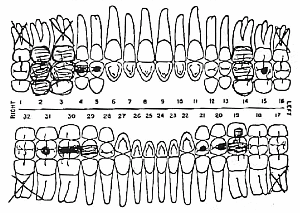
No. "DENTAL EXAMINATION" was the jaw-dropping headline. Attached to the e-mail was a summary of George W. Bush's 1973 exam in Alabama -- a "full mouth periapical," no less. "This dental examination documents the president serving at Dannelly [Air National Guard] Base, Alabama, on January 6, 1973," White House press secretary Scott McClellan announced in an accompanying statement.
Thus did the president's aides try to end the curiously reborn controversy over whether Bush did his Vietnam War-era duties in Alabama in 1972-73. Yet, yesterday morning, a mere 12 hours after Bush exposed his bicuspids, McClellan was providing new details about Bush's driving record: two teenage car accidents and two speeding tickets, undisclosed until now.
The spokesman volunteered these embarrassing tidbits because, he said, the release of part of Bush's National Guard records with the "arrest record" redacted -- that is, blacked out -- could fuel conspiracy theories.
It's all part of a painful lesson Bush has learned in recent days about the slippery slope of disclosure. It began when the president, in an interview on NBC's "Meet the Press" broadcast Sunday, agreed to release all records regarding his National Guard service. The White House insisted the records had already been released, but the vow to disclose all information opened the floodgates for old records the White House had said did not exist.
First came the National Guard payroll records, on Tuesday, which the White House said proved Bush did his duty in 1972 and 1973. But those records did not prove where Bush served or whether he did any drills.
Thus yesterday's release of Bush's dental exam. The diagrams indicate the future president was missing four wisdom teeth (numbers 1, 16, 17, 32) and one molar (no. 3) and had seven fillings (pre-molars 4, 5, 20 and 21 and molars 15, 30 and 31). An accompanying statement from the White House doctor, Richard J. Tubb, attested: "I have reviewed the medical and dental records of President George W. Bush covering the period from 1968-73," and Bush "was fit for continued flying duties."
But the dental disclosure only raised more questions that the conspiracy-minded could sink their teeth into: If the White House doctor reviewed Bush's medical records from his Guard period, that means such records exist -- so why wasn't the White House releasing them? The document proves that Bush submitted to the dentist's drill in Alabama, but what about military drills? Bush had said he returned to Texas before January 1973 -- so what was his mouth still doing in Alabama?
Flying to Harrisburg, Pa., aboard Air Force One yesterday, McClellan mused: "I suppose some might now try to suggest that, well, this is only his teeth, this doesn't show that he was there." . . .
Will that be the end of the disclosures? Don't count on it. McClellan tried Wednesday to retreat from Bush's televised agreement to release his entire military file. The president, therefore, finds himself in an election-year disclosure dilemma over old records. If he reneges on his promise to release them, he may appear to be hiding something. If he releases them, he risks more flaps over missing molars.
"Drip, Drip, Drip" -- Kevin Drum at calpundit.com, 2/13/04:
You may recall the full text of George Bush's answer to Tim Russert on Sunday regarding his National Guard files:
Russert: But you authorize the release of everything to settle this?
President Bush: Yes, absolutely. We did so in 2000, by the way.
"We did so in 2000, by the way."
Really? And yet after I posted a copy of Bush's 1972-73 ARF Retirement Credit Summary on Sunday, the White House followed up by releasing the same document on Tuesday, along with a previously unreleased set of payroll records. On Wednesday they released a copy of his dental records. Finally, on Thursday, they showed reporters an unredacted copy of the part of Bush's 1968 National Guard application that asks if he's ever been arrested . . .
So what's there? Reporters didn't get copies of the document, but the LA Times reports that it was nothing serious:
According to McClellan's unaltered copy, Bush responded: "Misdemeanor, New Haven, Connecticut, December 1966, charge dismissed.
"Two speeding tickets, July '64 and August '64, $10 fine, Houston traffic court.
"Two collisions, July '62 and August '62, $25 fine, Houston traffic court."
I continue to be stupefied by this performance. First, why did Bush say on Sunday that everything had been released in 2000 only to have own staff then release a bunch of previously unreleased documents on Tuesday?
And why-oh-why are they playing "document of the day"? It's as if they're pursuing some bizarre strategy deliberately designed to prove to the world that they have plenty of documents in their possession and they are carefully releasing only the helpful ones after long and careful examination. It's just mind-bogglingly stupid.
There are only two things to do in a situation like this: either stonewall completely or else open up the entire file and take their lumps for what's in it. (Adding a tearful Clintonesque apology would probably work pretty well in the latter case, although I suspect Bush's personality may be a little too Nixonian to pull something like that off.) Instead they seem bound and determined to keep this stuff dripping out in the most transparently self-serving way possible. It's unbelievable.
"President's On-Guard and Off the Mark" -- Thomas M. DeFrank in The New York Daily News, 2/13/04:
President Bush's crisis management corps is so contemptuous of Washington's political culture that they have foolishly ignored the cardinal rule of damage control: If there's nothing to hide, don't behave as if there were.
As a result, a downbeat political week for the President was made worse by bumbling White House attempts to explain former Lt. Bush's service in the Air National Guard.
Granted, Democrats are furiously stoking the story for partisan advantage. Party chairman Terry McAuliffe, who probably couldn't tell an M-1 rifle from an M-1 tank, is way over the line alleging Bush was AWOL from the Guard in the 1970s.
Presidential hopeful John Kerry has not helped his war-hero image much, either, by studying his combat boots and letting McAuliffe's slander stand.
Yet the President's reputation for plain-talking has been breached, a largely self-inflicted wound. Bush's vow on "Meet the Press" to release all his service records has been followed by grudging, piecemeal disclosure by his handlers.
"They're still in their trademark Texas mode of telling reporters only what they want them to print," a highly placed Bush loyalist said yesterday. "They've always resisted the art of getting bad news out on their terms."
Instead of quickly lancing the boil with a full "document dump," the White House acts as if there's some dark secret lurking in Bush's musty Guard files.
"Bush's Driving Records Disclosed" -- Dave Moniz and Jim Drinkard in USA Today, 2/13/04:
The White House disclosed information in documents Thursday showing that President Bush had been arrested once for a college prank and was cited for two automobile accidents and two speeding tickets before he enlisted in the National Guard.
The accidents and tickets were disclosed for the first time in response to questions about a portion of Bush's military record that had been blacked out when the file was made public during the 2000 presidential campaign.
The traffic violations are significant in the context of Bush's military career. At the time Bush enlisted in the Texas National Guard, the Air Force typically would have had to issue a waiver for an applicant who had multiple arrests or driving violations.
An officer who served at the same time as the president, former Texas Air National Guard pilot Dean Roome, was required by the Air Force to get a waiver for a $25 speeding ticket when he enlisted in the Air National Guard in 1967.
There is no record of an enlistment waiver in Bush's military file.
Critics have charged that Bush received favorable treatment to get into the National Guard and avoid serving overseas at the height of the Vietnam War. His father was in Congress at the time.
Bush joined the Guard in 1968 and was honorably discharged in 1973. He received a competitive spot in a fighter jet unit at a time when there was a long waiting list for National Guard openings. He was allowed to leave a little less than a year before his commitment was up to attend graduate school at Harvard.
White House press secretary Scott McClellan showed a small group of reporters a copy of Bush's application to be an officer, with nothing blacked out, after USA TODAY published a picture of the blacked-out document Thursday. The accompanying report said that Guard officials in Texas had been concerned about embarrassing information in Bush's military records before the files were released to the public beginning in 1999, according to two former Guard officials. . . .
The White House described the four traffic incidents as two ''negligent collisions'' in July and August 1962 and two speeding tickets in July and August 1964. Bush was a teenager at the time.
McClellan did not indicate any cause of the accidents. He said Bush paid a $10 fine for the speeding tickets and a $25 fine for the collisions. It was not immediately clear whether the amounts were for each incident or combined.
Bush's military file contained a second document that also asked for information on any arrests. Portions of that page, his enlistment application, are also blacked out.
"Bush a No-Show at Alabama Base, Says Memphian" -- Jackson Baker in The Memphis Flyer, 2/13/04:
Two members of the Air National Guard unit that President George W. Bush allegedly served with as a young Guard flyer in 1972 had been told to expect him and were on the lookout for him. He never showed, however; of that both Bob Mintz and Paul Bishop are certain.
The question of Bush�s presence in 1972 at Dannelly Air National Guard base in Montgomery, Alabama � or the lack of it � has become an issue in the 2004 presidential campaign.
Recalls Memphian Mintz, now 63: �I remember that I heard someone was coming to drill with us from Texas. And it was implied that it was somebody with political influence. I was a young bachelor then. I was looking for somebody to prowl around with.� But, says Mintz, that �somebody� -- better known to the world now as the president of the United States -- never showed up at Dannelly in 1972. Nor in 1973, nor at any time that Mintz, a FedEx pilot now and an Eastern Airlines pilot then, when he was a reserve first lieutenant at Dannelly, can remember.
�And I was looking for him,� repeated Mintz, who said that he assumed that Bush �changed his mind and went somewhere else� to do his substitute drill. It was not �somewhere else,� however, but the 187th Air National Guard Tactical squadron at Dannelly to which the young Texas flyer had requested transfer from his regular Texas unit � the reason being Bush�s wish to work in Alabama on the ultimately unsuccessful U.S. Senate campaign of family friend Winton "Red" Blount.
It is the 187th, Mintz�s unit, which was cited, during the 2000 presidential campaign, as the place where Bush completed his military obligation. And it is the 187th that the White House continues to contend that Bush belonged to � as recently as this week, when presidential spokesman Scott McClellan released payroll records and, later, evidence suggesting that Bush�s dental records might be on file at Dannelly.
�There�s no way we wouldn�t have noticed a strange rooster in the henhouse, especially since we were looking for him,� insists Mintz, who has pored over documents relating to the matter now making their way around the Internet. One of these is a piece of correspondence addressed to the 187th�s commanding officer, then Lt. Col. William Turnipseed, concerning Bush�s redeployment.
Mintz remembers a good deal of base scuttlebutt at the time about the letter, which clearly identifies Bush as the transferring party. �It couldn�t be anybody else. No one ever did that again, as far as I know.� In any case, he is certain that nobody else in that time frame, 1972-73, requested such a transfer into Dannelly.
Mintz, who at one time was a registered Republican and in recent years has cast votes in presidential elections for independent Ross Perot and Democrat Al Gore, confesses to �a negative reaction� to what he sees as out-and-out dissembling on President Bush�s part. �You don�t do that as an officer, you don�t do that as a pilot, you don�t do it as an important person, and you don�t do it as a citizen. This guy�s got a lot of nerve.�
Though some accounts reckon the total personnel component of the 187th as consisting of several hundred, the actual flying squadron � that to which Bush was reassigned � numbered only �25 to 30 pilots,� Mintz said. �There�s no doubt. I would have heard of him, seen him, whatever.� Even if Bush, who was trained on a slightly different aircraft than the F4 Phantom jets flown by the squadron, opted not to fly with the unit, he would have had to encounter the rest of the flying personnel at some point, in non-flying formations or drills. �And if he did any flying at all, on whatever kind of craft, that would have involved a great number of supportive personnel. It takes a lot of people to get a plane into the air. But nobody I can think of remembers him.
�I talked to one of my buddies the other day and asked if he could remember Bush at drill at any time, and he said, �Naw, ol� George wasn�t there. And he wasn�t at the Pit, either.��
The �Pit� was The Snake Pit, a nearby bistro where the squadron�s pilots would gather for frequent after-hours revelry. And the buddy was Bishop, then a lieutenant at Dannelly and now a pilot for Kalitta, a charter airline that in recent months has been flying war materiel into the Iraq Theater of Operations.
�I never saw hide nor hair of Mr. Bush,� confirms Bishop, who now lives in Goldsboro, N.C., is a veteran of Gulf War I and, as a Kalitta pilot, has himself flown frequent supply missions into Iraq and to military facilities at Kuwait. He voted for Bush in 2000 and believes that the Iraq war has served some useful purposes � citing, as the White House does, disarmament actions since pursued by Libyan president Moammar Khadaffi � but he is disgruntled both about aspects of the war and about what he sees as Bush�s lack of truthfulness about his military record. . . .
�It bothered me that he wouldn�t �fess up and say, Okay, guys, I cut out when the rest of you did your time. He shouldn�t have tried to dance around the subject. I take great exception to that. I spent 39 years defending my country.�
"Seeking Memories of Bush at an Alabama Air Base" -- David Barstow in The New York Times, 2/13/04:
MONTGOMERY, Ala., Feb. 12 � Inside the Alabama Air National Guard an informal search is on for someone, anyone, who recalls encountering First Lt. George W. Bush in 1972.
At Fort George C. Wallace, the Montgomery headquarters of the Alabama National Guard, officials have responded to growing scrutiny of President Bush's military record by searching through records for proof of his service in the 187th Tactical Reconnaissance Group. Former comrades from the 187th have been calling and e-mailing one another, always with the same basic question: Did you see him?
So far, it appears that their efforts have come to naught. Indeed, in interviews this week with The New York Times, 16 retired officers, pilots and senior enlisted men who served among hundreds with the 187th in 1972 all said that they simply could not recall seeing Mr. Bush at Dannelly Air Base, the sprawling compound adjacent to Montgomery's airport that is home to the 187th.
Those interviewed either held key supervisory positions at the base or were members of the fraternity of pilots and navigators who often congregated in a lounge on the second floor of Dannelly's main hangar. They worked in different units of the 187th, including the maintenance squadron, the supply squadron, the headquarters staff, flight safety and the flight operations center.
Yet try as they might � nearly all voiced strong support for Mr. Bush � none remembered crossing paths with him. Nor had any heard of anyone else in the 187th who recalled seeing him. . . .
For his part, Mr. Bush has never offered any detailed descriptions of what jobs he did at the 187th. "I can't remember what I did, but I wasn't flying because they didn't have the same airplanes," he told reporters in 2000.
His aides have said he did "desk work." . . .
[T]he interviews this week deepen a mystery that first surfaced during the 2000 presidential campaign when The Boston Globe reported that there was no record that Mr. Bush showed up for Guard drills between May 1972, when he moved to Alabama from Texas to work on a United States Senate race, and May 1973. Mr. Bush had been ordered in September 1972 to report for "equivalent training" to William R. Turnipseed, the 187th's deputy commander of operations, but The Globe quoted Mr. Turnipseed in 2000 as saying that Mr. Bush never reported to him.
In response to The Globe's article, Mr. Bush's election campaign appealed for members of the Alabama Air National Guard to come forward and vouch for his service, and a group of Vietnam veterans in Alabama offered a $1,000 reward for anyone with proof that Mr. Bush served. No one has come forward.
Sensing an opening in a new election year, leading Democrats have recently seized on the issue anew by hammering one simple question: If Mr. Bush served in Alabama, how come no one remembers him?
This week the White House released additional military records in an effort to prove that Mr. Bush performed duty here. The latest records, released Wednesday night, show that he visited a dentist at Dannelly on Jan. 6, 1973.
Mr. Bush's spokesmen have previously said that Mr. Bush lived in Alabama from May to November 1972, and then moved to Houston when the election was over. But Scott McClellan, the White House press secretary, said on Thursday that Mr. Bush recalled returning to Alabama for some of his Guard service even after he had moved to Houston.
Asked about the 16 members of the 187th who do not remember Mr. Bush serving in Alabama, Mr. McClellan responded that Mr. Bush's dental examination "demonstrates that he was serving in Alabama." Mr. McClellan also said that at least two people recalled Mr. Bush serving in Alabama, among them Joe Holcombe, who worked on the Senate campaign with Mr. Bush, and Emily Marks Curtis, who has said she briefly dated Mr. Bush in Alabama.
Mr. McClellan pointed to an article in The Times Daily, an Alabama newspaper, in which Ms. Curtis was quoted as saying that "the thing I know about George is that after the election was over in November, George left and he said he came back to Montgomery to do his Guard duty."
But Ms. Curtis and Mr. Holcombe have also told reporters that they never actually saw Mr. Bush at Dannelly. . . .
The closest any officer came to recalling Mr. Bush's presence at the 187th was Robert L. Ficquette, another captain and supervisor in the communications unit. "I remember the name passing in front of me some way," he said, although he said he could not be sure when or how or why. But he, too, said he did not recall seeing Mr. Bush. . . .
Several retired members of the 187th suggested that the most logical place for Mr. Bush was the operations center, where his pilot training could be put to good use processing flight plans and schedules. Indeed, this was the unit he was directed to report to in September 1972.
Mr. Garrett said that those who worked in the "ops center" were "like a family." Would he remember if Mr. Bush had been assigned to work in his command post?
"I think I would have recalled somebody being set in there like that," he said. "If I ever saw him, he never made an impression on me."
"Ala. Guardsmen Don't Remember Bush at Base" -- AP story in Newsday, 2/13/04:
The dental records released by the White House were intended to support President George W. Bush's account of his Air National Guard service in Alabama, but several members of the Guard unit said in interviews they don't remember ever seeing Bush at their Montgomery base. Nor does the dentist recall treating Bush. But all of them told The Associated Press that doesn't mean he wasn't there.
A Republican official who worked with Bush in an Alabama campaign in 1972 said she recalled him talking about his National Guard duty and seeing him in uniform before the election that year. The official, Jean Sullivan, said she remembered hearing rumblings even then about whether he was fulfilling his Guard obligations, but attributed them to "some idiots" who resented that he was from Texas and that he was on duty the minimum required time.
"Ex-Guardsman Recalls Bush Service in 1972" -- AP story in Newsday, 2/13/04:
A retired Alabama Air National Guard officer said Friday that he remembers George W. Bush showing up for duty in Alabama in 1972, reading safety magazines and flight manuals in an office as he performed his weekend obligations.
"I saw him each drill period," retired Lt. Col. John "Bill" Calhoun said in a telephone interview with The Associated Press from Daytona Beach, Fla., where he is preparing to watch this weekend's big NASCAR race.
"He was very aggressive about doing his duty there. He never complained about it. ... He was very dedicated to what he was doing in the Guard. He showed up on time and he left at the end of the day."
Calhoun, whose name was supplied to the AP by a Republican close to Bush, is the first member of the 187th Tactical Reconnaissance Group to recall Bush distinctly at the Alabama base in the period of 1972-1973. He was the unit's flight safety officer.
The 69-year-old president of an Atlanta insulation company said Bush showed up for work at Dannelly Air National Guard Base for drills on at least six occasions. Bush and Calhoun had both been trained as fighter pilots, and Calhoun said the two would swap "war stories" and even eat lunch together on base.
Calhoun is named in 187th unit rosters obtained by the AP as serving under the deputy commander of operations plans. Bush was in Alabama on non-flying status.
"He sat in my office most of the time -- he would read," Calhoun said. "He had your training manuals from your aircraft he was flying. He'd study those some. He'd read safety magazines, which is a common thing for pilots." . . .
"I knew he was working in the senatorial campaign, and I asked him if he was going to be a politician," said Calhoun, who is a staunch Republican. "And he said, 'I don't know. Probably."'
"Bush in Alabama" -- Kevin Drum at calpundit.com:
A witness has come forward who remembers George Bush showing up for National Guard drills in Alabama:
A retired Alabama Air National Guard officer said Friday that he remembers George W. Bush showing up for duty in Alabama in 1972, reading safety magazines and flight manuals in an office as he performed his weekend obligations.
"I saw him each drill period," retired Lt. Col. John "Bill" Calhoun said in a telephone interview with The Associated Press from Daytona Beach, Fla., where he is preparing to watch this weekend's big NASCAR race.
....The 69-year-old president of an Atlanta insulation company said Bush showed up for work at Dannelly Air National Guard Base for drills on at least six occasions.
This just gets more and more bizarre. "At least" six occasions?
But Bush's own retirement records and pay records show only four drill periods between May 1972 and January 1973, and nobody suggests he was in Alabama anytime outside those dates.
In addition, the dates on both the pay and retirement records don't match up to the known drill periods for the unit Bush and Calhoun were assigned to. If Calhoun saw Bush "each drill period," why wasn't Bush paid for those dates?
"W's AWOL Spin Update! -- David Corn at thenation.com, 2/13/04:
It seems the Bush White House cannot mount its defense of George W. Bush's Air National Guard service without raising more questions.
On February 12, Dan Bartlett, the White House communications director, said that the White House had received about 30 pages of medical records from Bush's Guard file. He said they contain "nothing unusual." Then why won't the administration release them--especially after Bush promised on Meet the Press to make his entire file available? Bartlett also acknowledged that the administration has obtained Bush's complete military record from the Air Reserve Personnel Center in Denver. That, too, is not being made public (at least, not yet).
Retired National Guard officials say that these records should include material detailing what Bush did in Alabama. These documents could be the final word--if they indicate that Bush did appear at Alabama and perform the duty he was obligated to do and if they document that he reported back to his Houston base once he returned from Alabama after the November 1972 election (remember, Bush's file includes an annual performance review dated May 2, 1973, that says he had not been seen at the Houston base for a year) and if they explain why Bush, who had trained as a fighter pilot, failed to take a flight physical exam and was removed from flight status.
Then there's the this-just-in account from John "Bill" Calhoun, a Republican businessman in Atlanta. The Washington Post reported that "a Republican close to Bush" supplied the newspaper the phone number of Calhoun, who was an officer with the Alabama Air National Guard in 1972. Calhoun told the Post that he saw Bush sign in eight to ten times for duty at the 187th Tactical Reconnaissance Group at Dannelly Field in Montgomery from May to October 1972. Calhoun said, "He'd sit on my couch and read training manuals and accident reports and stuff like that."
Four years ago, when the where-was-W story broke (thanks to a piece by The Boston Globe's Walter Robinson), the Bush campaign promised it would release names of individuals who had served with Bush in Alabama. It never did. The campaign did provide the name of a former girlfriend, but she only said that Bush had told her that he had to report for duty in Alabama; she could not attest that he actually did. Finally, Bush has one witness--out of the 600 to 700 people who served at the Alabama base in 1972.
But Calhoun's account is contradicted by other information--including the few pages of records that the White House released earlier this week. Calhoun says that Bush showed up for duty several times from May to October 1972. But the payment and retirement records the White House handed out three days earlier show that Bush received no pay or attendance credits from April until the end of October 1972. Why, then, is Calhoun's account not in sync with the documents that, according to the White House, settles the matter?
Moreover, the paper trail to date indicates that Bush was not supposed to report to this Montgomery base until October 1972. This is the chronology.
- In May of 1972, Bush moved to Alabama to work on the Senate campaign of a family friend. He asked the Guard to do "equivalent training" at a unit there, and he won approval to join a unit temporarily at Maxwell Air Force Base. But that unit had no airplane or pilots, and the Air Reserve Personnel Center ultimately disallowed this transfer, as an investigation published by TomPaine.com first noted in 2000.
- In September 1972, Bush asked to do duty at Dannelly Field in Montgomery and permission was granted.
The commander of that base and his deputy have said they do not recall Bush reporting for duty. The White House has produced pay sheet summaries that show Bush was paid for duty performed on October 28 and 29 and November 11 through 14 in 1972. These records do not state what duty was performed or where. But if they are indeed accurate (as the White House claims), they indicate Bush performed no other duty from May to December 1972. The question is, how could Calhoun have seen Bush eight to ten times from May to October at Dannelly Field if the available record states that Bush was not told to report to Dannelly Field until September and that Bush did not receive any payment or attendance credits in that May-to-October period other than for two days at the end of October?
Three decades is a long time, and perhaps Calhoun's memory is off on the dates. But Bush's inability to produce a witness prior until now and his unwillingness to provide any recollections of what he did when he served in Alabama (or what he did regarding the Guard when he returned to Houston) are reasons to be wary of late-in-the-game eyewitness testimony that is facilitated by an unnamed "Republican close to Bush." Would GOPers--or a single GOPer--concoct a fake alibi for Bush? Perhaps. As noted below, one former National Guard official charges that a Bush aide cleaned out portions of Bush's military records in 1997--an allegation denied by the White House.
There may be a legitimate explanation for the contradictions between Calhoun's recollections and the documents. Could Bush have been showing up "unofficially" at Dannelly Field? Was there a record-keeping screw-up regarding his request to do his time at that base? But given the dishonest spin the White House has resorted to in trying to defuse the AWOL controversy--and given Bush's broken promise--there is reason to be suspicious of any information that is selective, unconfirmed or contradicted. That is why that at this point Bush has only one honorable option: release the records.
"Credibility Gulch" -- Dan Froomkin in The Washington Post, 2/13/04:
In an entirely unscientific vein, I asked you readers in yesterday's column where you think this military service story is going.
The response was overwhelming, in number and in intensity. I repeat: This is not a scientific sample -- it obviously skews heavily, though not entirely, toward the Bush-haters. And I heard from a lot of veterans. But credibility did seem like a consistent theme.
The voices are real, the emotions are raw, and, well, my readers rock.
I've reproduced more than 100 of the responses here.
"Press Briefing by Scott McClellan" -- whitehouse.gov, 2/13/04:
Q Can I ask you a question, Scott? I just want to be absolutely clear on something here. The records that you released earlier this week on the President's Guard service state that he did not perform any Guard service in the third quarter of 1972. That's correct?
MR. McCLELLAN: Well, you have the records in front of you, and they state the dates on which he was paid. And you are paid for the days on which you serve.
Q So they state that between April 16th of 1972 and October 28th of 1972 he did no Guard duty.
MR. McCLELLAN: We've been through these issues, John, and we've provided you with the documents that show his service.
Q And do you believe that's correct, that he did no duty between April 16th and October 28th?
MR. McCLELLAN: John, I don't know why we need to go through this again. This issue we've been through earlier this week.
Q Well, the reason I bring up the question is that John Calhoun, who claims he was the person in charge of making sure that President Bush reported for duty at the 187th Tactical Recon Group, says that he saw the President several times on the base between May and October of 1972, yet there is no record of him being there, in terms of what you released earlier this week.
MR. McCLELLAN: I don't speak for him. You would have to talk to Mr. Calhoun. I do not know him.
Q We did talk to Mr. Calhoun, and Mr. Calhoun said that he saw the President several times between May and October of 1972.
MR. McCLELLAN: And like I've said --
Q So I was just wondering, can you explain that discrepancy?
MR. McCLELLAN: And like I've said, the President doesn't recall the specific dates on which he performed his duties. He does remember serving both in Alabama and in Texas. During that entire period, he was a member of the Texas Air National Guard.
Q But the records that you released do recall quite specifically the days that the President served on. There's no record of his being there --
MR. McCLELLAN: Actually, these are National Guard records that document the President did serve during that time period. And that was an issue that was raised earlier this week.
Q Right. But the records clearly recall that he did no Guard duty between April 16th and October 28th. Yet, Mr. Calhoun says he saw him on the base at the 187th between May and October of '72. So there's a discrepancy here. I'm wondering if you can explain it?
MR. McCLELLAN: John, again, we've provided you with the records and the facts are in the records that we have.
Q A good point. Could the records be incomplete?
MR. McCLELLAN: I'm sorry?
Q Could the records be incomplete?
MR. McCLELLAN: Direct that question to the National Guard. These are the personnel records that we've received.
Q Scott, have you been through the entire personnel file now? And have you released everything you're going to release?
MR. McCLELLAN: Well, like I said, that if there is additional information that comes to our attention that is relevant to the issue, we will certainly provide you with that information. That's a commitment that we've made.
Q But have you seen the entire file? That sounds like a reasonable question.
MR. McCLELLAN: Have I seen the entire file? I don't know the answer to that question at this point, because there is a possibility -- we have expected to receive additional documents from the National Guard. I think we just very recently received some additional documents, but I'm not sure if any of those documents are new. We're going to take a look at those. We'll take a look at those, and if there's new information relevant to the issue, then we will certainly provide you with that information. . . .
Q The President, in his interview on Sunday, was asked the first question about possible release of records, the first question about possible release. He was asked, when there were questions about Senator John McCain's record, Wesley Clark's record, they authorized the release of their entire file. The President was asked, would he do that? And he replied, "Yeah." So why is the President reneging on that pledge?
MR. McCLELLAN: John, do you want to continue on and go through the rest of that questioning?
Q Because that was the first question to which he answered in the affirmative -- don't try to parse it out.
MR. McCLELLAN: John, here's the question, quote from Tim Russert. "But you will allow pay stubs, tax records" --
Q Let's go with the first question. You're parsing.
MR. McCLELLAN: No, I think you are, because the issue that Tim Russert raised was whether or not he had served while he was in Alabama.
Q Read the first question, Scott.
MR. McCLELLAN: "But you will allow pay stubs, tax records, anything to show that you were serving during that period." "Yes. If we still have them." We have provided you with that information, and we will continue to.
Q Read the first question.
MR. McCLELLAN: I just -- you read the first question. I read this question. It was the --
Q Right. It was the very first question --
MR. McCLELLAN: The context of this discussion --
Q The very first question, when he said, "entire record," the President said, "Yeah."
MR. McCLELLAN: Oh, John, let's look at the context of the discussion. The context of the discussion was clear about whether or not he had served while he was in Alabama. It was very clear.
Q The first question was about entire --
MR. McCLELLAN: We can agree to disagree on this issue, but I think it was very --
Q We're going to end up on the Daily Show again with this one.
MR. McCLELLAN: -- very clear about the context of the question.












